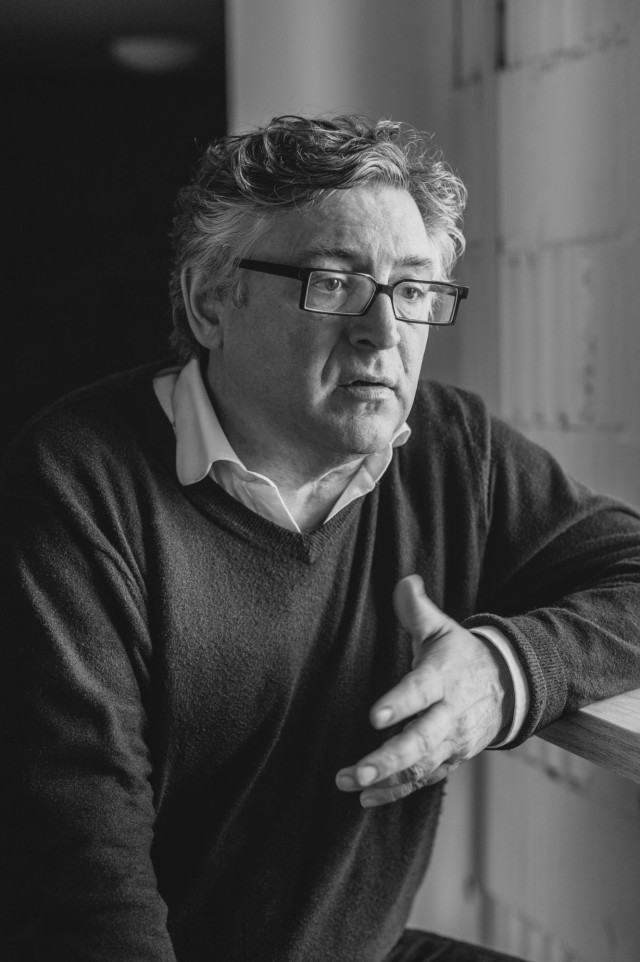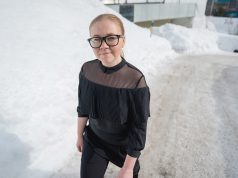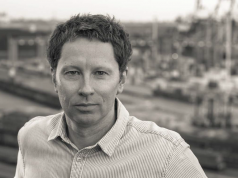Michel Onfray is widely acknowledged to be one of France’s most prominent thinkers. A self described ‘Anarchist Hedonist’ he is an original and important philosopher who has worked within multiple domains of Continental and French philosophy. He is also an active political commentator who holds strong opinions on matters of geopolitics. This interview with him was conducted in Odessa by the French novelist Sophie Schulze immediately after his talk at the Terminal 42 venue in Odessa. Some of the views Onfray expresses here are fairly controversial and in some of his comments (especially those dealing with the issue of the annexation of the Crimean peninsula) mirror what are now widely discredited Kremlin narratives that have fueled the conflict in Ukraine.
Odessa Review: You have not been in Odessa for long. However, as a “hedonistic philosopher’’, maybe you can tell us already if you are enjoying the city?
Michel Onfray.: Listen, I’m here with my partner, who got robbed of her purse yesterday. We spent the whole time here at the police station getting our papers in order. So I haven’t seen much. And we have to take the train tonight. We met up with some people at the train station to get duplicate papers. We are unable to even withdraw money with our credit cards to pay back the people who have been helping us out.
OR: So, until now, this has been a rather unpleasant experience for you…
MO: No, it’s just one person. I’m not going to blame an entire city for the misdeed of one individual. The little bit I’ve seen, it felt like a mix of looseness and seriousness. We’ve been treated to pleasant venues and good food, got to see some beautiful things. People seem to be happy. But I think there must be vast disparities. I get the feeling there’s a very western, westernized part, but when you look out the window, it’s not all that you see. There’s also a hidden city that I haven’t seen. Though I’ve seen that it does exist.
OR: During your lecture you outlined the link between philosophy and autobiography. So what was it that made you, personally, want to come to Odessa? What does this city represent for you?
MO: Well, just the name is legendary, for a start. One doesn’t know much concrete about it. Kyiv, Odessa, these are names that remain in the realm of the mythical. That said, I’ve been translated in to thirty or so languages, and I always give a positive answer to invitations to travel abroad. In this case it’s Andreï, my translator, who took it upon himself to translate my work. He’s not getting paid much for this translation work. The publisher is taking all the risks. So since I know they’ve been putting that much work into it, I feel like it’s my duty to come here and meet with the readers. A book is a team effort. Of course, I wrote it. But it’s also being translated, published, distributed to the bookstores. So I think it’s only normal that I should answer such invitations. Firstly, that is on an intellectual level. I also want to meet people, to understand their world directly. People have spoken a lot about the Maïdan, about Ukraine. These discussions are often very much politicized in France. So it makes you want to meet people to be able to make up your own opinion directly.
OR: Speaking of politics, I don’t know if you’ve heard that the city just launched a de-Sovietization, or de-Decommunization campaign. For example, the street names are being changed. What do you think of this way of relating to the past?
MO: For my part, I’ve seen that de-Sovietization works first and foremost inside of people’s heads. It is not by demolishing buildings, knocking down Lenin’s statues, or changing costumes, that one’s going to change half a century of impregnation. It all happens inside the head. And I happen to think that it can only be possible through educating the youth, maybe also the seniors, but to do that you need to really make some history. You need to explain what the Soviet Union really was like, what Stalin’s grip over Ukraine meant. You have to remake history, I mean really do it. Personally I see the Soviet Union everywhere here, in the guise of bureaucracy. I knew the Soviet Union a little bit, as I lived there for three weeks forty years ago and I now again I see what I saw back then. That is everything is falling apart, the elevators don’t work, you’re in the bath and the pipes suddenly blow up in your face, the carpets are stained etc… Indeed one gets the feeling that the Soviet page hasn’t been quite turned yet. This morning, in order to get a refund for these tickets, I had to make duplicates of the stolen tickets. While we’ve lost everything, all our papers, our credit cards, our passports, our train tickets to get back to Kiev tonight. And then instead of saying ‘’Of course, we’ll help you out’’, it’s just ‘no’! On top of it, there are no seats left in the train, although I was travelling with my partner. So you can in effect buy new tickets to get in, except you’ve lost your seats. And they wouldn’t do anything about it until I got mad. In French, of course. So that people would calm down a bit. And so as if by chance we were then able to buy the two tickets. But still we had to buy new ones. So first, you get robbed, then you get robbed a second time by other people that won’t recognize the first theft. So indeed, it’s obvious there’s a sort of mob involved here. Not everyone ends up losing. De-Sovietizing would also mean changing that. It’s not only renaming streets.
OR: In your lecture you’ve identified yourself as a non-Marxist hedonist. What would be, then, a Marxist hedonism?
MO: There is no such thing as a Marxist hedonism. Marxism is the opposite of hedonism. It’s austerity for everyone, except for a few regime apparatchiks who still gets caviar, good wine, girls, luxury cars, beautiful houses etc… Marxism is an anti-hedonism and one should fight it as much as one should fight American consumerism.
OR: Ukraine finds itself at an important, a strategic crossroad, at this point in its history. On the one hand the old communism stands firm, and on the other hand part of Ukraine is fighting to obtain membership into the circle of liberal democracy. And so during your lecture you were speaking about the lies of liberal democracy. What are these lies that Ukraine should be wary of?
MO: The lies that liberal democracies are telling is that ‘’freedom means freedom for everyone, and that prosperity means prosperity for everyone.” The truth is that a few enjoy freedom, and a few do prosper. The truth is that not everyone is getting rich, this is a pauperized society. That is the rich get ever richer and fewer, and the poor get ever poorer and more numerous. You only have to look around everywhere liberalism rules. We’ve been sold this idea that freedom means enabled consumption everywhere and for everyone, but then we realized that it’s not true, that it only makes it possible for those who actually have the means to consume. One should tell people who think liberal Europe is paradise that it is also hell.
I’ve seen that de-Sovietization works first and foremost inside of people’s heads that doesn’t need to lean either to the side of Washington or Moscow
OR: You said that as an anarchist you stood with those who are subjected to power. Does that mean that intellectuals should support Ukraine’s aspiration to independence?
MO: No, I think intellectuals should do whatever they want. Everyone chooses their fight. Intellectuals are very diverse in France, there are people such as Bernard- Henri Levy, Luc Ferry, Alain Badiou, Rancière, André Comte-Sponville. These are all people with extremely diverse positions. I think it’s in Ukraine’s best interest to be neither Western nor Russian. To be whatever it wants to be. That is to pave its own way, by reclaiming an identity that doesn’t need to lean either to the side of Washington or to Moscow. One should say what one wishes and what one wants to say. I have always thought it a pity to present people with simplistic alternatives such as either the Soviet Union or the United States. In the 50’s this attitude caused a great many intellectuals to say stupid things. Great intellects like Sartre have been massacred by saying such things. Even Raymond Aron, who said: ‘If I must choose, I choose the United-States’. Since a choice has to be made, I’m choosing the Soviet Union, countered Sartre. But Camus said no to both sides. It’s a difficult position to hold, since it gets you enemies everywhere. But meanwhile it’s the one free position. Today everybody’s saying Sartre was wrong and Camus was right. I think Ukraine’s destiny doesn’t lie with Russia, nor with western Europe. Ukraine’s destiny is in Ukraine.
OR: So you disagree with the position Bernard- Henri Levy defended two years ago, when he performed his play ‘Hotel Europa’’ in Odessa, before it premiered in Paris?
MO: I do. It’s the American position for an Americanized Ukraine. That means impoverishment, the rule of the market. It’s what we’re used to, McDonalds everywhere, big cars for people who can afford them, poverty and impoverishment for those who can’t.
OR: So then maybe we might say that, visiting this city, one feels like being in Prague before the Americans turned up?
MO: Very early this morning, I studied what the countryside I was going through looked like. Entering Odessa, you see shabby, filthy buildings falling apart and people living in shacks. You can’t escape the poverty. And it’s obvious what liberalism would produce in this configuration. I don’t think people would make it. You’ve got a taste of that with people that can’t afford a visa to come to France, although they are working people. So that is liberalism.
OR: Since you are a free spirit, what do you think about the way the French media presents Putin’s Russia these days?
MO: They chose one of two ways to present them. Some say that it is the devil, some say that it is God. Since I don’t believe in either God nor the devil, I’m looking at who does what, who proposes what, who are the agents, to try to understand who Putin really is. But it’s not an easy thing to know.
OR: How would you describe Russia? As a dictatorship, an authoritarian regime, something else in nature?
MO: It’s a mix of authoritarianism, dictatorship and mafia. Obviously. It’s not normal when journalists are shot in the streets, or when political opponents and feminists get criminalized and jailed. That is the opposite of democracy. That seems obvious. It is an autocratic, dictatorial regime, with a muzzled press and a civil society dominated by the political order.
OR: Don’t you think that given the great importance that Islam has come to take in the French debate, there is consequently a tendency to minimize what’s happening on Europe’s eastern border, matters related to Ukraine or Russia?
MO: You are absolutely right about that. Nowadays in France there are only three important matters: the presidential election, Marine Le Pen’s relative influence, and Islam. If you watch the news, that’s all they’re about. All the time.
OR: These are three related matters, one might add
MO: Yes, in some ways, you are right. For one thing, the French aren’t interested in international strategy, or in global politics. People are so deeply ignorant when it come to geography. They live under a kind of media perfusion. They spend about three and a half hours per day in front of their television, on average. And they rarely tune into an intelligent channel. Well I don’t even think there actually is one intelligent channel. So it’s difficult to make up one’s own opinion. Today all one’s got is the dominant French media view on politics or on Ukraine. One day they broadcast something about the Maidan. But the day after they will have moved on to something else, for example someone in the Balkans, who stole money from his constituency. That’s become news. And the next day brings something new. I think people don’t know where Ukraine is. They don’t know where to put it on a map. They are utterly ignorant of what’s at stake. They don’t know if Putin invaded Ukraine, or if Crimea was part of Ukraine or not. There’s a huge ignorance about these matters.
OR: And did it affect you? What were your thoughts when you learned that Crimea became Russian, along with great cities likes Sevastopol or Yalta, that are not at all excluded from the collective unconscious?
MO: I must confess I still haven’t understood. How come it happened the way it did? How come nobody reacted? Why is that Ukraine didn’t react? Why did Europe not react? Why did the United States not react? It all happened so fast, just like that and Crimea became Russian. Why has Crimea become Russian? One would want to know, to understand, but then one tells oneself that one just does not have all the cards to understand. I read an article by Hélène Carrère d’Encausse in Le Figaro. And I told myself, here’s a different voice. She’s more or less saying that Crimea had always been Russian anyway so that’s not a problem. But I don’t think that’s so simple. For example, Normandy used to be an independent duchy, so it should be one again because it once was. But that’s not a reason. The fact that one land was part of another country at one time isn’t proof that it should be part of it again. I’d rather have arguments to think this situation clearly. But the more I talk to people, the more I get confused.
Sophie Schulze is a French novelist who lives in Paris. She has written about Martin Heidegger and Hannah Arendt.




































